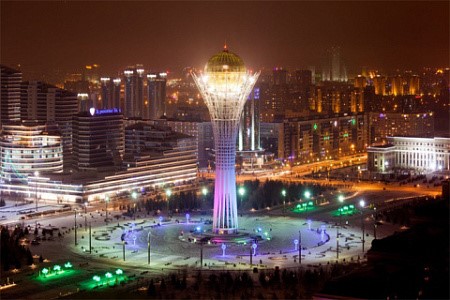Tokaev's version of 'justice'
To allay Putin's ill-will, Kazakhstan's ambassador to Moscow has published an article in an authoritative Russian daily in which he defends the transformations taking place in the country. He hoped that ‘the de-globalisation underway’ would not lead to ‘new opposing blocs’.
Astana (AsiaNews) - In a delicate phase of relations between Russia and Kazakhstan, underlined by the unexpected visit of former president Nursultan Nazarbayev to Moscow, where he held talks with Vladimir Putin, there is no shortage of comments attributing to the Kremlin a certain resentment towards the incumbent president of Astana, Kasym-Žomart Tokaev. This would also be evidenced by Putin's lack of greetings for Kazakhstan's Independence Day, which was celebrated on 16 December.
In an attempt to bring the view of these relations back to a more serene and balanced dimension, the Kazakh ambassador to Moscow, Dauren Abaev, published an article in the authoritative Russian newspaper Nezavisimaja Gazeta, entitled ‘Tokaev's five senses of justice’. In it he highlights ‘the great interest in our country throughout Russia’ on the part of politicians, as well as representatives of commerce, culture and art, and in many regions ‘in both the European and Asian parts’ of the Federation.
Abaev reports that ‘speaking with Russians, they often point out to me that the dynamics of change in Kazakhstan are so intense that it is not easy to understand them fully’. He confirms that the course taken to ‘build a just Kazakhstan’ has shaken many situations that had long been crystallised both in the system of state administration and in ‘relations between power and society’. Many choices have been decided with a long-term perspective in mind, and ‘only in a few years’ time will the political legacy of Tokaev be truly understood'.
The importance of justice is the ‘formative skeleton’ of the president's entire political vision, around which ‘all the other ideological principles are aggregated’. It is not just ‘an advertising slogan, but the true measure of the effectiveness of the reforms’ currently being implemented. Already in the 2019 election campaign, Tokaev has placed the emphasis precisely on justice, and the first meaning of this ideal concerns ‘law and order’: a just society is not possible without the equality of all citizens before the law, guaranteed by the impartiality of the judiciary. In this field, says the diplomat, ‘our country has taken giant steps forward’.
One of the most important reforms has been the formation of the Constitutional Court, to which every citizen can turn to defend his or her rights and freedom, and the administrative justice system, which protects potentially weaker parties even in conflicts with state bodies, is also functioning more effectively. The statistics reported by Abaev show that before the reforms, the state won 85 per cent of cases, whereas today it does not exceed 40 per cent.
The second reason for Tokaev's justice is explained as ‘participation in political life’, citing the recent example of the popular referendum on the construction of a new nuclear power plant, which was prepared by an ‘open and uncompromising’ confrontation in all regions. Another meaning is also added, that of the ‘just economy’, which is only at the beginning of a great transformation: ‘the state is geared towards forming a regime that is much more favourable to investment and initiatives in so many commercial sectors, which have hitherto been little practised’. The burden of bureaucracy is being eased, with many projects for free trade zones, and a fierce fight is being waged against the network of corruption that is blocking the entire development.
Particularly important is a ‘responsible and balanced foreign policy’ in the face of increasingly contradictory and unpredictable changes in international relations. Touching on the most sensitive issues for the Russian audience, the ambassador recalled that ‘the de-globalisation underway is in danger of leading to new blocs of confrontation’, due to war conflicts and the related mutual sanctions, which overshadow the real needs of citizens and states. This is why a ‘new ethic’ is needed to help the whole of humanity overcome ‘the schism of values’, Abaev concludes, without closing in on themselves and overcoming both the resentment and indifference of so many. The ‘new Kazakhstan’ aspires to contribute to the formation of an Adal Azamat, according to one of Tokaev's favourite expressions, a ‘New Man’ capable of facing the challenges of a changing world.
07/02/2019 17:28
12/02/2016 15:14







.png)










